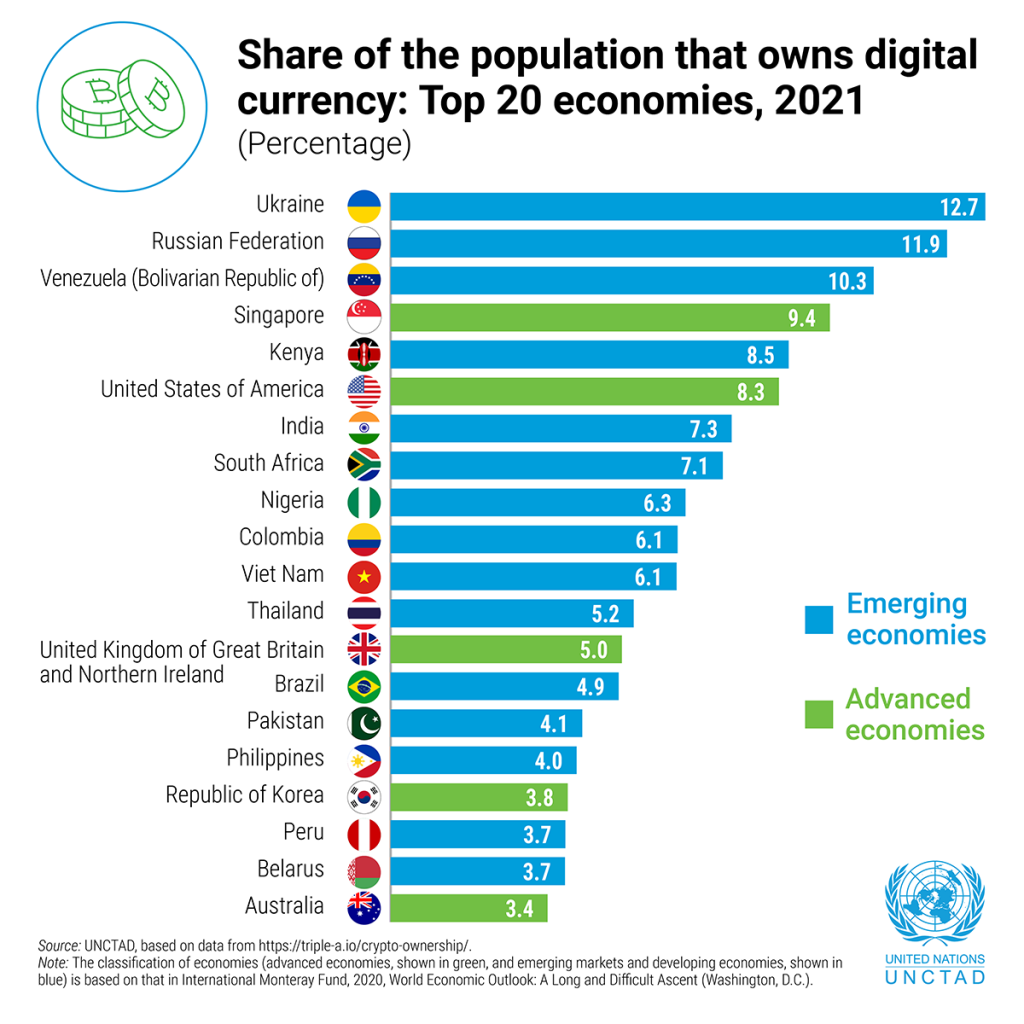The UN Conference on Trade and Development (UNCTAD) warned that cryptocurrencies are a volatile financial asset with the potential to have detrimental societal repercussions.
This policy brief aims to investigate the variables that have contributed to the rapid acceptance of cryptocurrencies in developing nations. These considerations include the convenience of sending remittances as well as the usage of cryptocurrencies as a hedge against inflation and currency concerns.
The United Nations Conference on Trade and Development (UNCTAD) issued three policy briefs on Wednesday, all of which called for measures to be taken to prohibit the use of cryptocurrencies in developing nations. Even though some individuals have profited from these private digital currencies and the assistance they provide with remittances, these assets are highly volatile financial instruments that also have adverse consequences on society.
In three policy briefs recently published by UNCTAD, the costs, and risks related to cryptocurrencies, such as the risks they pose to economic stability, the militarization of locally available resources, and the safety of currency systems, are discussed at length. These dangers include the dangers they pose to the security of monetary systems, domestic resource mobilization, and financial stability.
While cryptocurrencies have rewarded some, they are an unstable financial asset that can bring socioeconomic risks.@UNCTAD recommends policies actions to help halt cryptocurrency expansion in developing countries.https://t.co/wOwvr5A5rQ
— UN Trade and Development (@UNCTAD) August 11, 2022
The use of bitcoin skyrocketed worldwide, especially in less developed countries, when the COVID-19 pandemic was occurring. The UN Conference on Trade and Development (UNCTAD) cites the convenience of sending money home as one of the causes driving the rapid adoption of cryptocurrencies in poor countries. Another aspect is the usage of cryptocurrencies as a hedge against currency and inflation risks.
Recent market upheavals involving digital currencies have threatened users’ privacy when holding such currencies. Nevertheless, the agency warned that if the central bank stepped in to protect financial stability, the matter would be brought to the public’s attention.
The following are the policy briefs:
1) The policy brief titled “All that glitters is not gold”: The high cost of leaving cryptocurrencies unregulated” investigates the factors that have contributed to the rapid uptake of cryptocurrencies in developing nations. Some of these factors include the ease with which money can be sent home and the use of cryptocurrencies as a hedge against inflation and currency risks.
2) The white paper titled “Public Payment Systems in the Age of Digitalization”: The topic of “Responding to the Financial Stability and Security-Related Risks of Cryptocurrencies” centers on the influence that cryptocurrencies have on the safety and security of monetary systems in addition to the economic stability of economies.

It is believed that a national digital payment system that operates as a public utility could meet at least some of the motives for using cryptocurrencies and slow the growth of cryptocurrencies in developing nations.
Depending on the capabilities and requirements of the entire nation, the authorities in charge of monetary policy may introduce a digital currency issued by a central bank or, more likely, a rapid retail payment system. The United Nations Conference on Trade and Development (UNCTAD) is urging authorities to maintain the issuance and distribution of currency since failing to do so reveals the digital divide in poor nations.
3) In the policy brief titled “The cost of doing too little, too late”: How cryptocurrencies can subvert domestic economic growth in developing countries, the topic of how cryptocurrencies have emerged as a new route for undermining domestic resource mobilization in developing nations is discussed.
Although cryptocurrencies may make it simpler to make remittances, they may also make it feasible to cheat taxes and avoid paying them through illicit transfers. In this way, cryptocurrencies may function similarly to tax havens, which make it impossible to establish ownership of assets.
The United Nations Conference on Trade and Development (UNCTAD) has provided a list of recommendations, one of which is the limitation of advertisements for high-risk financial products such as cryptocurrencies. UNCTAD has encouraged authorities to take action to stop the spread of cryptocurrencies in developing nations and has provided a list of recommendations.
The agency also asserted that it is necessary to govern cryptocurrency exchanges, digital wallets, & decentralized finance and that regulated financial institutions should be prohibited from holding cryptocurrencies, such as stablecoins, or providing customers with products related to cryptocurrencies.
The United Nations Conference on Trade and Development (UNCTAD) believes that existing capital controls need to be rethought in light of the decentralized, borderless, & pseudonymous nature of cryptocurrencies.
Peoples Reactions
People on the internet believe that the United Nations is being dishonest by taking this latest action; users such as @MattAhlborg have accused the institution of having hidden agendas.
Your motivations are not honest. You are not honest people.
— Matt Ahlborg (@MattAhlborg) August 11, 2022
